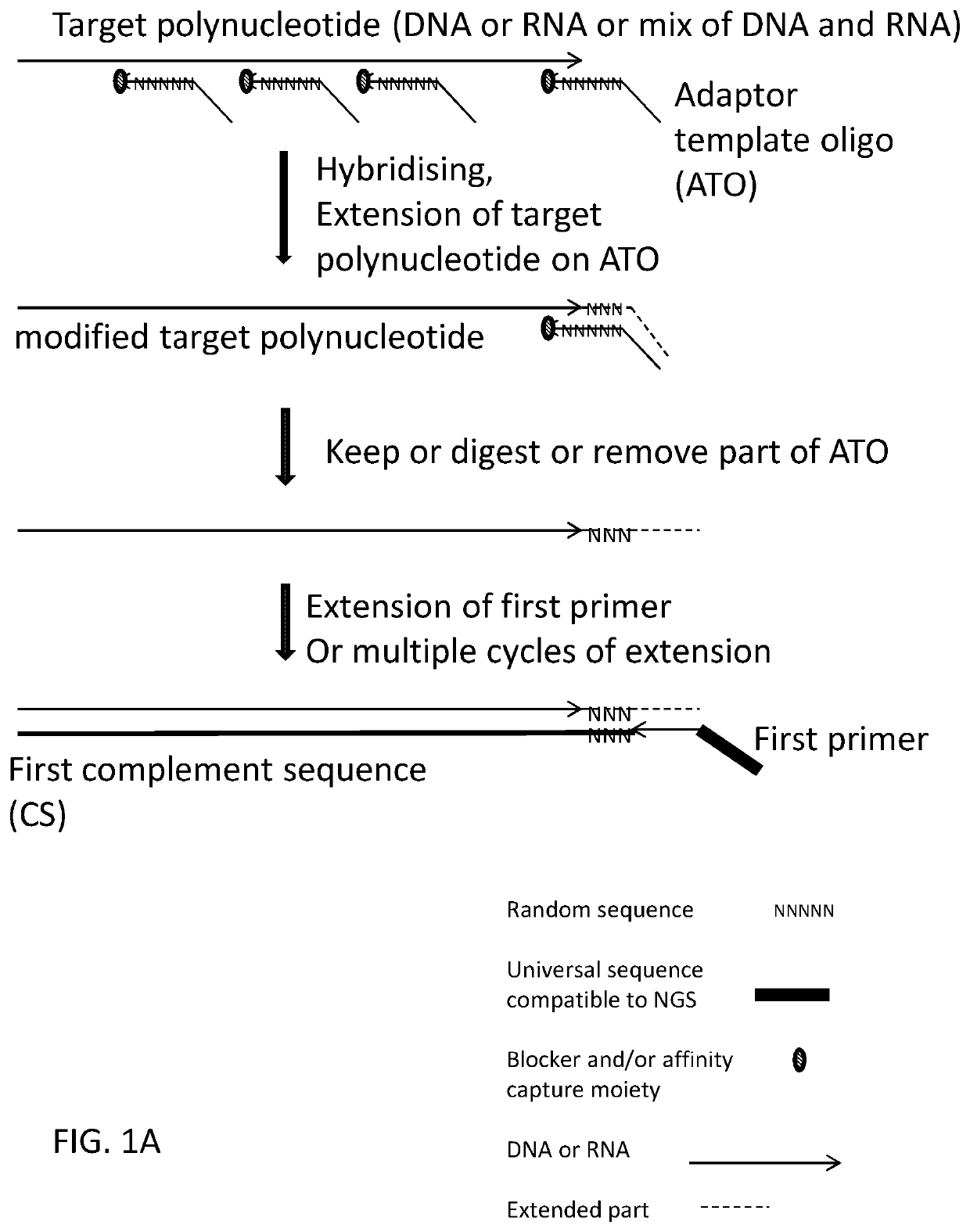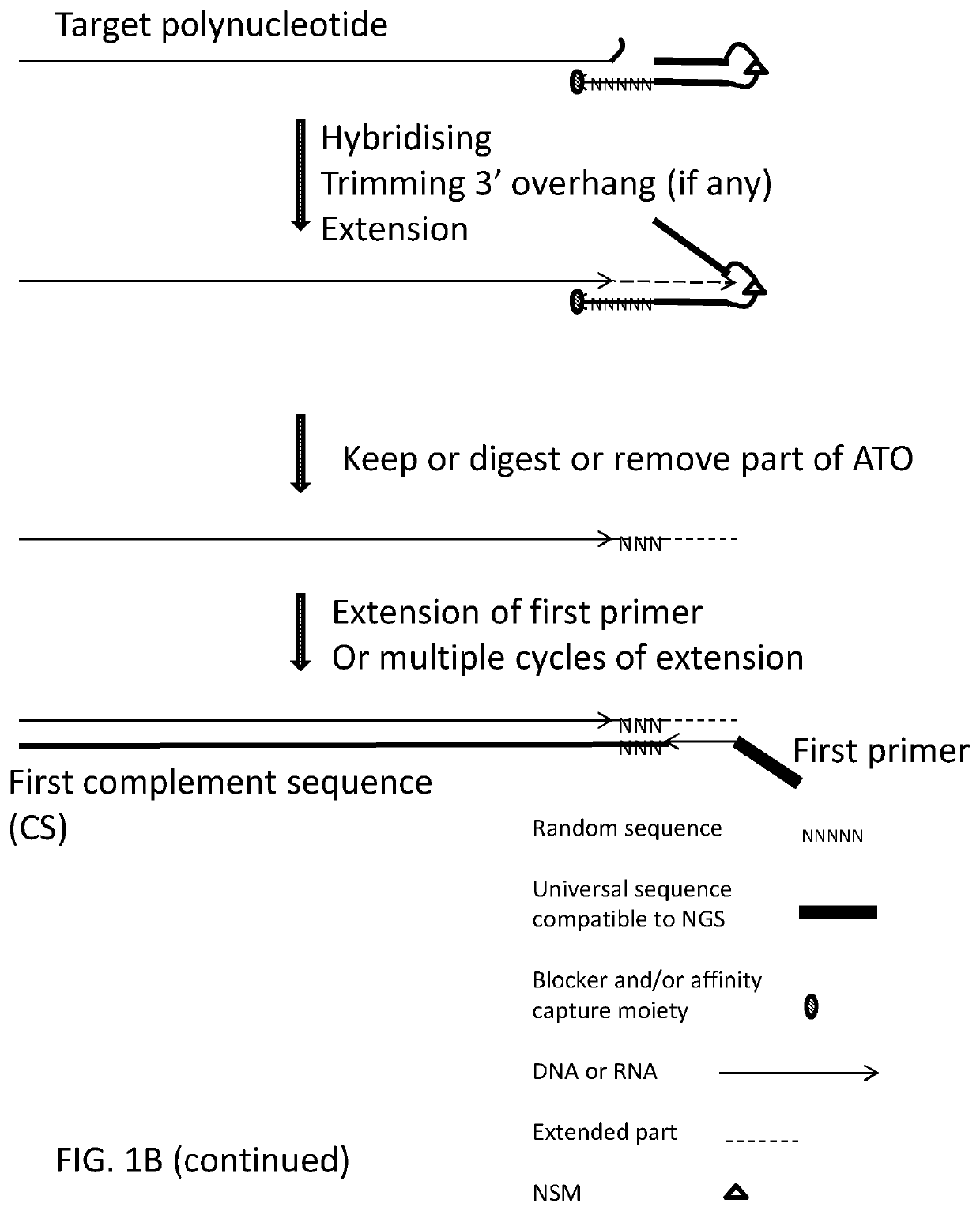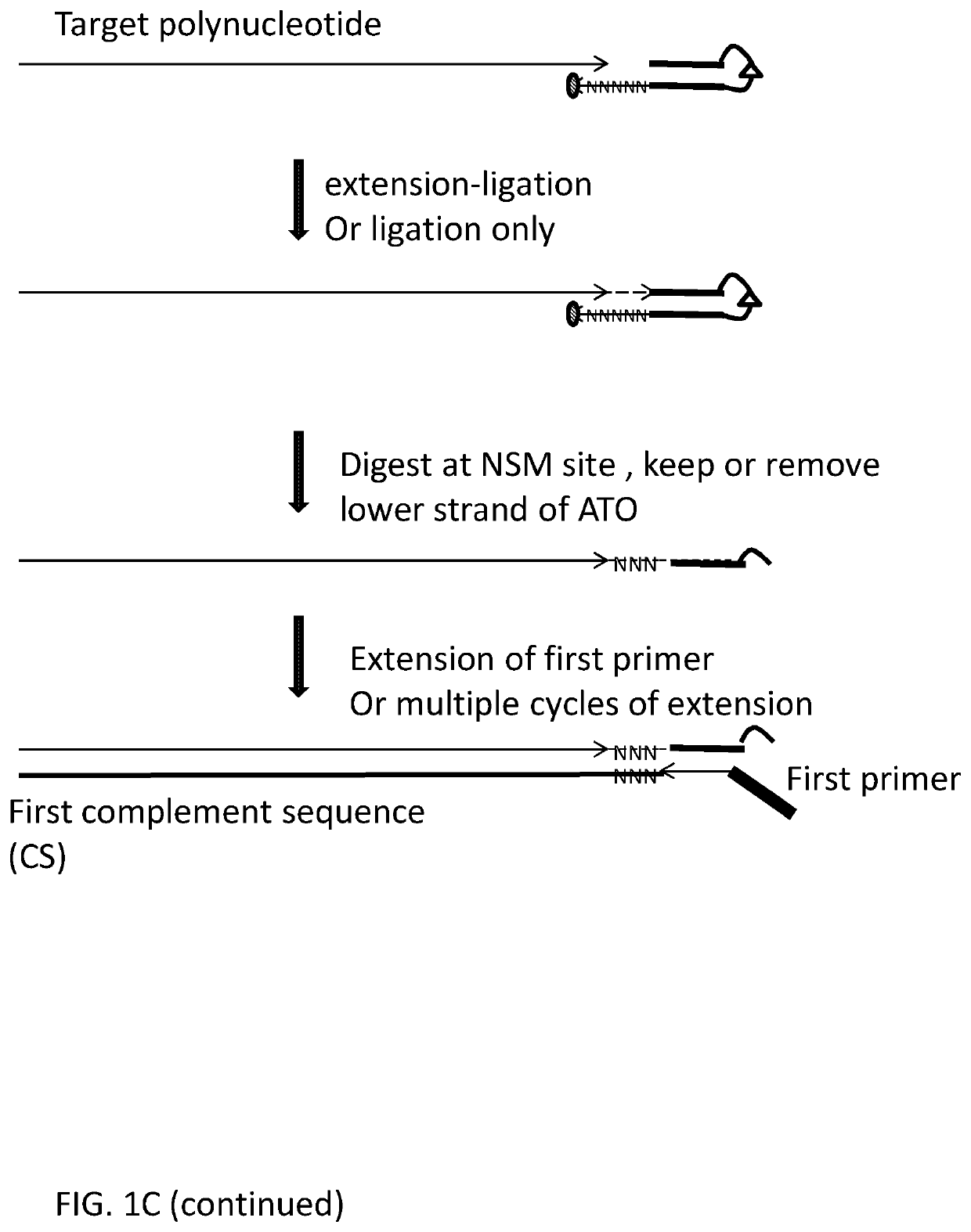Methods, Compositions, and Kits for Preparing Nucleic Acid Libraries
a technology of nucleic acid and composition, applied in the preparation of dna, microorganism testing/measurement, biochemistry apparatus and processes, etc., can solve the problems of difficult targeting of amplicon sequencing methods, hundreds of millions of sequencing errors, and difficult to use methods
- Summary
- Abstract
- Description
- Claims
- Application Information
AI Technical Summary
Benefits of technology
Problems solved by technology
Method used
Image
Examples
example 1
[0420]Using deoxyribonucleic acid (DNA) as the target polynucleotide for producing a Next Generation Sequencing Library (for example and without limitation, compatible with Illumina Next Generation Sequencers) using for example and without limitation, adaptor template oligo(s) with a stem-loop structure, wherein the loop comprises a chemical spacer (for example and without limitation, a C3 spacer, a C18 spacer).
Materials
[0421]Target polynucleotide, human gDNA (BIO-35025)
DNA fragmenting enzyme, KAPA Frag Kit (Roche, 7962517001)
Adaptor template oligos (ATO), 1-014, 1-015, 1-016, 1-017, 1-018 (Table 1)
TAQ DNA polymerase (NEB, M0273L)
TAQ DNA polymerase buffer (NEB, M0273L)
DNA Polymerase I, Large (Klenow) Fragment (NEB, M0210L)
DNA Polymerase I, Large (Klenow) Fragment (NEB, M0212L)
[0422]dNTPs (NEB, N0447s)
USER® Enzyme (NEB, M5505S)
Phusion® High-Fidelity DNA Polymerase (NEB, M0530S)
[0423]Phusion buffer (NEB, M0530S)
Primers, 2-001, 2-002, 2-003 (Table 2)
[0424]Ammonium sulphate (SIGMA, A441...
example 2
[0436]Using deoxyribonucleic acid (DNA) as the target polynucleotide for producing a Targeted Amplicon Next Generation Sequencing Library (for example and without limitation, compatible with Illumina Next Generation Sequencers) using for example and without limitation, an adaptor template oligo(s) with a hairpin produced using a chemical spacer (for example and without limitation, a C3 spacer, a C18 spacer).
Materials
[0437]Target polynucleotide, human gDNA (BIO-35025)
DNA fragmenting enzyme, KAPA Frag Kit (Roche, 7962517001)
Adaptor template oligos (ATO), 1-006 (Table 1)
TAQ DNA polymerase (NEB, M0273L)
TAQ DNA polymerase buffer (NEB, M0273L)
DNA Polymerase I, Large (Klenow) Fragment (NEB, M0210L, M0212L)
[0438]dNTPs (NEB, N0447s)
Phusion® High-Fidelity DNA Polymerase (NEB, M0530S)
[0439]Phusion buffer (NEB, M0530S)
USER® Enzyme (NEB, M5505S)
Primers, 2-004, 2-005 (Table 2)
[0440]Ammonium sulfate (SIGMA, A4418)
Agencourt AMPure XP (Beckman Coulter, A63881)
[0441]Bioanalyzer high sensitivity kit f...
example 3
[0449]Using deoxyribonucleic acid (DNA) as the target polynucleotide for incorporating a promoter for an RNA polymerase to drive amplification of DNA in to RNA using, for example and without limitation, an adaptor template oligo(s) containing sequence compatible with and capable of working as an RNA polymerase promoter as well as a hairpin produced by a nucleotide sequence.
Materials
[0450]Target polynucleotide, human gDNA (BIO-35025)
DNA fragmenting enzyme, KAPA Frag Kit (Roche, 7962517001)
Adaptor template oligos (ATO), 1-012 (Table 1)
TAQ DNA polymerase (NEB, M0273L)
TAQ DNA polymerase buffer (NEB, M0273L)
DNA Polymerase I, Large (Klenow) Fragment (NEB, M0210L, M0212L)
[0451]dNTPs (NEB, N0447s)
USER® Enzyme (NEB, M5505S)
T7-Scribe Standard RNA IVT kit (CELLSCRIPT, C-AS3107)
Method
Annealing of an Adaptor Template Oligo(s) to Deoxyribonucleic Acids
[0452]As in example 1, except the ATO contains sequence(s) compatible with and capable of acting as an RNA polymerase promoter (for example and wit...
PUM
| Property | Measurement | Unit |
|---|---|---|
| temperature | aaaaa | aaaaa |
| volume | aaaaa | aaaaa |
| temperatures | aaaaa | aaaaa |
Abstract
Description
Claims
Application Information
 Login to View More
Login to View More - R&D
- Intellectual Property
- Life Sciences
- Materials
- Tech Scout
- Unparalleled Data Quality
- Higher Quality Content
- 60% Fewer Hallucinations
Browse by: Latest US Patents, China's latest patents, Technical Efficacy Thesaurus, Application Domain, Technology Topic, Popular Technical Reports.
© 2025 PatSnap. All rights reserved.Legal|Privacy policy|Modern Slavery Act Transparency Statement|Sitemap|About US| Contact US: help@patsnap.com



